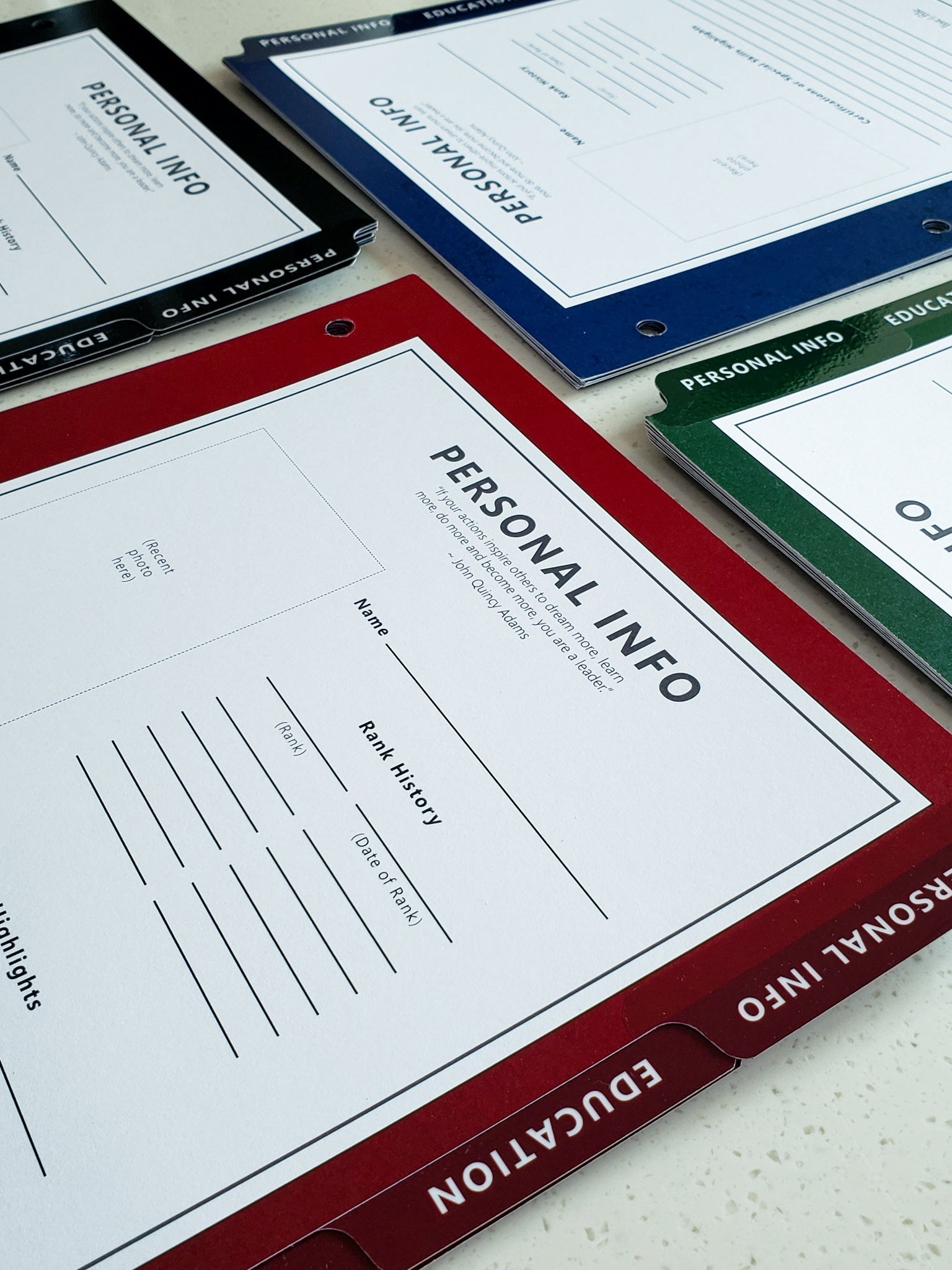
Why organization matters for U.S. servicemembers (even when the government keeps records)
When you raise your right hand and swear the oath, you’re not just joining the military—you’re signing up for a lifetime of paperwork.
Orders. Evaluations. Medical files. DD-214s. PCS checklists. Training certificates. Leave requests. Deployment documents. Awards. Promotion packets. The list goes on.
And while the military does its best to keep its own records, here’s the honest truth: those systems are not flawless. Paperwork gets lost. Systems get updated. Offices close. And when you’re standing in line at the VA, applying for a home loan, or trying to verify service for a civilian job, the difference between smooth sailing and frustrating delays is often this:
Did you keep a copy for yourself?
If you’ve ever heard a seasoned vet say “Keep everything,” you should believe them.
It’s easy to assume that because the military tracks every training, promotion, deployment, and piece of paperwork, you don’t need to. After all, the government’s got it, right? Well… yes and no.
The truth is, having your own personal copies of key service-related documents can save you serious time, money, and stress down the road—especially when it comes to things like VA claims, transitioning out of active duty, or applying for certain benefits.
Why You Should Keep Your Own Records
Let’s break it down. The Department of Defense does maintain service records—but that doesn’t always mean they’re easy to access, or complete when you need them.
Veterans tell us again and again: delays, lost files, and miscommunications happen. Here’s what that can look like in real life:
"I can't say this enough times. KEEP EVERYTHING. I did, and I had to produce documents from the 80s to prove I was stationed on multiple ships full of asbestos. I even hit them with old LES statements that showed I was earning sea duty pay along with fitness reports stating I was on three different ships. They even denied it the first time I filed. But the second time, I got my rating."
"Submitted a claim for a broken foot, they deferred it for evidence, went through my records and found the navy hospital report so it’s being disputed right now."
"I got out of the military in '88. I kept all of my records for about 20 years and finally purged them while getting ready for a move. Big Mistake. I am currently filing for an increase in disability and for a few new items. It took me over a year to get a copy of my medical records and I am still working on getting a copy of my service records (the copy from the National Archives was illegible). Do what the others suggested and scan then for electronic storage, but at least keep the important docs as paper."
"Yes! keep it! I had use for mine last year and I got out in 1993."
"When I was trying to increase my V.A. disability due to a active duty shipboard injury accident, I was admitted and discharged from the civilian hospital that I was admitted to, and was given a complete copy of all the things that was charged ( itemized) and procedures that were performed. Total bill the U.S. government paid, $156000.00. I kept that receipt for 22 years and when it came to my C&P exam, the examiner was shocked I had this original billing. I was 100% P&T shortly later. Always hang onto paperwork, never know when you'll need it."
"I have torn my house apart looking for a copy of a MRI to prove service connection for a tumor.
The MRI was done in 1985.
It's the link I need to positively connect my rare cancer with TCE, MEK, AFFF and FRH.
It's probably one of the records that missed being converted into a digital image in my records.
I was in the hospital for a week and VBA can't find any records lol."
"[Keep] Every single piece of paper. And I've been out for 16 years. You never know what you'll need.
About five years after I got out they tried to get me for $600 for saying that I still had a balance on my PX Star Card. I explained that as part of my clearing process I was required to have a zero balance on my card before I could out process.
Customer Service: "Well unless you have proof of payment we will still expect reimbursement."
Me: "I have the proof of payment."
CS: "What?"
Me: "I have the proof of payment. I have the original receipt from my home station PX showing a zero balance and I have my clearing papers also confirming the zero balance. Do you want it mailed, emailed, or faxed?"
CS: ".....Email would be fine, sir...." "
Here’s why keeping your own well-organized copies of every service-related document matters:
- Claims & Benefits: VA disability claims, education benefits, retirement packages—all require documentation. Having your own file saves time and headaches.
- Civilian Transition: Employers often want proof of clearance, awards, or military experience. Having clean, accessible documentation can boost your job prospects.
- Financial & Legal Needs: Whether applying for a VA loan, GI Bill benefits for your kids, or verifying time in service, your personal record set becomes your safety net.
- Peace of Mind: When you’re organized, you’re not scrambling. You’re ready. And that kind of peace—especially post-service—is priceless.
So What Should You Keep?
A good rule of thumb: if you had to sign it, wait for it, or request it—keep it.
Here’s a short (non-exhaustive) list of what you’ll want to hold on to:
- DD-214 (your discharge paperwork—this is gold)
- Deployment orders
- LES (Leave and Earnings Statements)
- Medical records, especially any treatment related to injuries or illness
- Award certificates and evaluations
- PCS (Permanent Change of Station) orders
- Promotion documents
- School/course completion certificates (TAP, Airborne, language school, etc.)
Even digital documents should be downloaded and stored securely—just because it’s in your email inbox today doesn’t mean it will be tomorrow.
Organization Doesn’t Have to Be Complicated
At List & File, we’re here to make it simple.
Our Career Binders were built specifically for military families and veterans—offering a structured, smart, and secure organization solution that help you keep track of your most important documents without getting buried in a pile of paper.
You served with discipline. Let your paperwork reflect that.
Final Thought: “If it’s important, save it twice.”
Once in your official records, and once where you can access it—anytime, anywhere.
Your service deserves to be honored, protected, and proven—on your terms.
Stay organized. Stay empowered.
– The List & File Team



Leave a comment
This site is protected by hCaptcha and the hCaptcha Privacy Policy and Terms of Service apply.